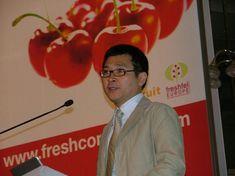
China has become the latest country to sign an agreement with EurepGAP to develop its own ChinaGAP.
Nigel Garbutt, president of EurepGAP, said China would now have its growing standards benchmarked against those of EurepGAP.
The deal saw Cheng Fang, vice-chairman of the Certification and Accreditation Administration of the People’s Republic of China, sign a “Memorandum of Understanding” on technical cooperation between his organisation and EurepGAP in Beijing recently.
The MOU will establish a good base for further co-operation in the area of good agricultural practices and will help push China into line with international practice.
Garbutt said: “The exporters and government are very keen to meet market requirements particularly the GAP standards required by international buyers. The main part of the agreement provides for the development of a ChinaGAP whereby China undertakes to gain full equivalence of their own standards with EurepGAP. This will bring transparency to the production standards employed and reassure buyers with full certification.”
The move will certainly put China in a stronger position on the export stage. At the moment the country remains relatively quiet when it comes to export, although that could be about to change.
Matthew Tang, of fresh produce investors Linkage Holdings, speaking to delegates at Fresh2005 in Hungary last week, said out of a total fruit and veg production of 76 million tonnes, China exports less than two per cent or 1.4mt. He said: “Over the last 25 years, production has increased 100 per cent every five years, but you can forget those numbers. That production is not good, it’s just production for the sake of it.”
However, the Chinese government is now investing significantly into the sector and China is beginning to form partnerships with the rest of the world, he said.
“We’re learning and, we’re looking for people to bring in technical knowledge and good equipment. We need people to come and see how we can work together.”
Garbutt is also in the process of benchmarking a KenyaGAP scheme as well. The news is a major boost to the cause for harmonisation of growing standards on an international level.
Ronald Bown, chairman of the Chilean Exporters Association, Asoex, called for the establishment of a Global Harmonisation Initiative Project to speed the process forward.
He said a working group could be formed under the GHIP, using existing industry resources, to tackle the issues facing the sector. “The consequences of non-harmonisation will be confusion and duplicated costs and it is an unsustainable process.”
He called for commitment from the retail sector to sign up to the concept, and not demand extra requirements on top. “If they’re changing things for their own benefit, then harmonisation is not possible.”
However Garbutt remained pessimistic that retailers would agree: “Nature’s Choice is often cited by growers. When I’ve taken it up with Tesco, they’ve pointed out that 95 per cent of their standard is based on EurepGAP.
“Will we ever be able to harmonise that five per cent? I don’t think so because the retailers will always want to differentiate.”



